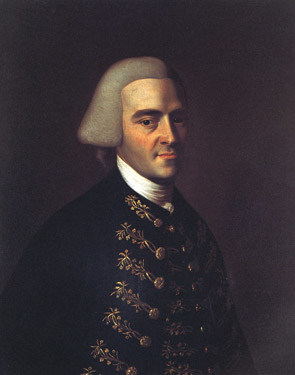John Hancock, merchant, politician, and owner of the most famous signature in American history, was born in Braintree, Mass., to John and Mary Hancock on January 12, 1737. At a young age he went to live with his uncle Thomas Hancock, one of Boston's wealthiest merchants. This experience, combined with a Harvard degree, helped young John to inherit his uncle's role as one of the most successful businessmen in Boston, a position he used to aid his burgeoning political career.
As a major merchant in colonial Boston, Hancock's business interests suffered under the new taxes imposed by the British Parliament in the mid 18th century. Hancock became more and more active in Massachusetts and national politics throughout the 1770s, and in 1775 he went to Philadelphia as a member of the Second Continental Congress. It was this body that eventually produced the Declaration of Independence, a document that Hancock, as presiding officer, so famously signed.
During the Revolutionary War, Hancock left the Congress and was elected the first governor of Massachusetts in 1780. Both a generous and a shrewd politician, he became even more popular than before the war. He would serve on and off as governor until his death in 1793.
Hancock's finest moment may have come in 1788 when he offered qualified support for the ratification of the United States Constitution by Massachusetts. Although five states had already ratified the Constitution, the remaining states looked to Massachusetts, where the vote was expected to be close. Although Hancock felt some concern about the sweeping powers the federal government would hold, his support insured that Massachusetts would vote to ratify, and that, in turn, sent a signal to the states that remained undecided.
Although John Hancock is rarely mentioned alongside fellow Massachusetts patriots John Adams and Samuel Adams, he made important contributions to the state and the young nation. A moderate leader, he often helped conflicting parties reach a compromise. Perhaps of even greater significance, he remained a generous benefactor to Massachusetts and its citizens throughout his adult life.
BACK
